2020九年级英语上册 Unit 1 The Changing World句式精讲精练仁爱版
2020 仁爱英语九年级上册Unit1-Unit2课文翻译

Unit 1 The changing world变化中的世界Topic 1 Our country has developed rapidly我国发展迅速Section A1a:(After a long holiday, Kangkang is happy to see his friends.)(长假过后,康康很高兴会见到他的朋友们。
)Hi, Jane! Did you have a good summer holiday?你好,简,你暑假过得愉快吗?Yes. What about you?是的,你呢?Not bad. Rita, you have just come back from your hometown. How was your trip?不错。
丽塔,你刚从家乡回来,你的旅行怎么样?Great! I went to many places near my home in India. Great changes have taken place there and my hometown has become more and more beautiful. Where have you been, Jane? 好极了!在印度,我去了我家附近的很多地方。
那里发生了很大的变化,而且我的家乡变得越来越美丽了。
简,你去哪里了?I have been to Mount Huang with my parents. It's a beautiful place. But there were so many people that I couldn't find a good place to take photos. And where have you been, Kangkang ? 我和我的父母去过黄山,那是一个美丽的地方。
但是那里人太多了,我都找不到一个好的地方拍照。
九年级英语上册 Unit 1 The Changing World Topic 2 The pop

九年级英语上册Unit 1 The Changing World Topic 2 The population in developing countries is growing faster语法小结素材(新版)仁爱版编辑整理:尊敬的读者朋友们:这里是精品文档编辑中心,本文档内容是由我和我的同事精心编辑整理后发布的,发布之前我们对文中内容进行仔细校对,但是难免会有疏漏的地方,但是任然希望(九年级英语上册Unit 1 The Changing World Topic 2 The population in developing countries is growing faster语法小结素材(新版)仁爱版)的内容能够给您的工作和学习带来便利。
同时也真诚的希望收到您的建议和反馈,这将是我们进步的源泉,前进的动力。
本文可编辑可修改,如果觉得对您有帮助请收藏以便随时查阅,最后祝您生活愉快业绩进步,以下为九年级英语上册Unit 1 The Changing World Topic 2 The population in developing countries is growing faster语法小结素材(新版)仁爱版的全部内容。
Unit1 Topic2 语法小结第一部分现在完成时表示过去发生或已经完成的动作对现在造成的影响或结果,也可表示过去已经开始,一直延续到现在的动作或状态。
学习现在完成时,先从结构和句式开始:构成:主语 + have/has + 过去分词 + 其他。
(当主语是第三人称单数时用has,其余人称用have.过去分词:规则动词的过去分词构成与动词过去式相同;不规则动词需要特殊记忆.)否定式:主语 + haven't/hasn't + 过去分词 + 其他。
疑问式: Have /Has + 主语 + 过去分词 + 其他?简略答语: Yes,主语 + have/has.(肯定)No,主语+ haven’t/hasn’t.(否定)第二部分现在完成时的含义之一是过去完成的动作对现在仍有影响,用以下四大标志词可以表达这种含义:以already, just和yet为标志already, just和yet 表示到现在为止动作或状态已经、刚刚或还没有发生。
英语九年级上册 重点句型(Unit 1 The changing world - Topic 3 . )-导学案-仁爱版
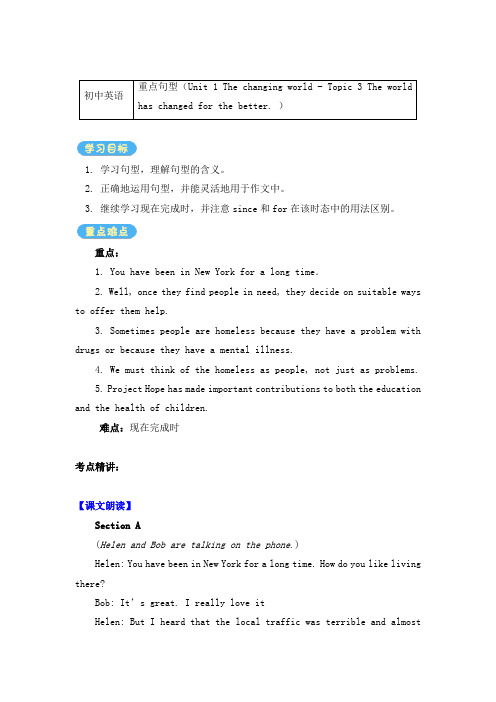
初中英语重点句型(Unit 1 The changing world - Topic 3 The world has changed for the better. )1. 学习句型,理解句型的含义。
2. 正确地运用句型,并能灵活地用于作文中。
3. 继续学习现在完成时,并注意since和for在该时态中的用法区别。
重点:1. You have been in New York for a long time.2. Well, once they find people in need, they decide on suitable ways to offer them help.3. Sometimes people are homeless because they have a problem with drugs or because they have a mental illness.4. We must think of the homeless as people, not just as problems.5. Project Hope has made important contributions to both the education and the health of children.难点:现在完成时考点精讲:【课文朗读】Section A(Helen and Bob are talking on the phone.)Helen: You have been in New York for a long time. How do you like living there?Bob: It’s great. I really love itHelen: But I heard that the local traffic was terrible and almosteveryone drove too fast.Bob: Oh, you will get used to it very soon if you come.Helen: I also heard the streets were dirty.Bob: They used to be, but the city has improved a lot since I came here a few years ago.Helen: Isn’t it dangerous to live there?Bob: Well, it was in the past, but it’s quite safe now. As a matter of fact, it’s a wonderful place to live. Near our block, there are beautiful parks, good schools, famous museums and excellent restaurants. And you can go to plays, concerts and operas every day if you like. You must come for a visit. Then you can see New York yourself.Section BMaria: What are you reading, Jane?Jane: I’m reading a newspaper from Canada. Martin showed me an interesting article. It is about a program that helps homeless people.Maria: Are there homeless people in Canada?Jane: Oh, yes. Many countries have homeless people. The article says one city has a wonderful program. Since it started, it has helped hundreds of people return to work and live a normal life.Maria: That sounds great! How do they manage it?Jane: Well, once they find people in need, they decide on suitable ways to offer them help.Maria: Can the homeless people get enough food, homes and medical treatment?Jane: Yes. And it’s not only that. The program also provides them with job training so that they can find jobs again.Maria: I think it is important for these people to feel good about themselves.Jane: You are right. The world has changed for the better.Section COne of the most basic human needs is a home. A home is a safe place. While most people around the world value their homes, there are many people in every country who are homeless.Some people are homeless for a short period of time because they are moving from one place to another, and other people are not able to find a home. They must live on the streets or in a shelter.There are many causes of homelessness. Sometimes people can not keep a home because they do not earn enough money, or because they do not have a job. Sometimes people are homeless because they have a problem with drugs or because they have a mental illness. No one is ever homeless on purpose.Whatever the cause of homelessness is, the effects are the same. Homeless people must work very hard to live. They can not raise their children. Sometimes they must steal food just to eat. The government in every country has worked for many years to support the homeless but more needs to be done. We must think of the homeless as people, not just as problems.【句型精析】1. You have been in New York for a long time.你在纽约待了很长时间。
九年级英语上册Unit1TheChangingWorld知识点新版仁爱版
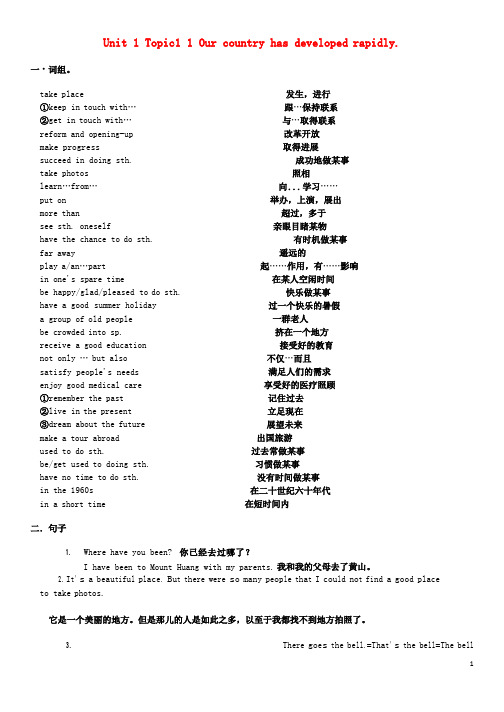
Unit 1 Topic1 1 Our country has developed rapidly.一·词组。
take place 发生,进行①keep in touch with…跟…保持联系②get in touch with…与…取得联系reform and opening-up 改革开放make progress 取得进展succeed in doing sth. 成功地做某事take photos 照相learn…from…向... 学习……put on 举办,上演,展出more than 超过,多于see sth. oneself 亲眼目睹某物have the chance to do sth. 有时机做某事far away 遥远的play a/an…part起……作用,有……影响in one's spare time 在某人空闲时间be happy/glad/pleased to do sth. 快乐做某事have a good summer holiday 过一个快乐的暑假a group of old people 一群老人be crowded into sp. 挤在一个地方receive a good education 接受好的教育not only … but also 不仅…而且satisfy people's needs 满足人们的需求enjoy good medical care 享受好的医疗照顾①remember the past 记住过去②live in the present 立足现在③dream about the future 展望未来make a tour abroad 出国旅游used to do sth. 过去常做某事be/get used to doing sth. 习惯做某事have no time to do sth. 没有时间做某事in the 1960s 在二十世纪六十年代in a short time 在短时间内二.句子1.Where have you been? 你已经去过哪了?I have been to Mount Huang with my parents. 我和我的父母去了黄山。
仁爱初中英语九年级上册Unit 1 the changing world词组句子基础知识归纳背诵版
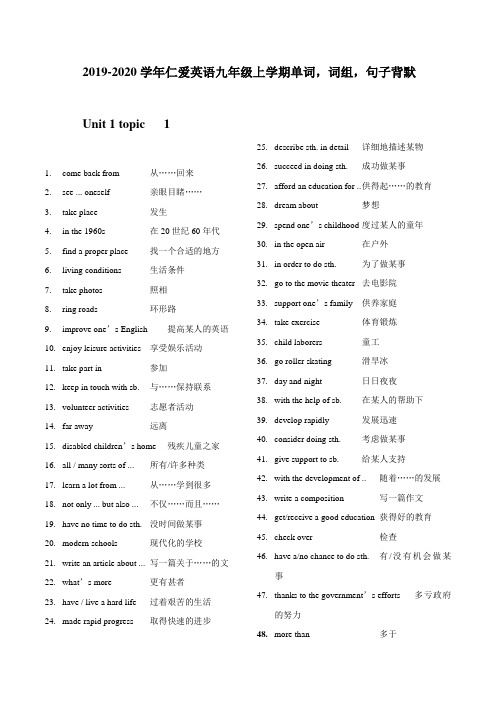
2019-2020学年仁爱英语九年级上学期单词,词组,句子背默Unit 1 topic 1e back from 从……回来2.see ... oneself 亲眼目睹……3.take place 发生4.in the 1960s 在20世纪60年代5.find a proper place 找一个合适的地方6.living conditions 生活条件7.take photos 照相8.ring roads 环形路9.improve one’s English 提高某人的英语10.enjoy leisure activities 享受娱乐活动11.take part in 参加12.keep in touch with sb. 与……保持联系13.volunteer activities 志愿者活动14.far away 远离15.disabled children’s home 残疾儿童之家16.all / many sorts of ... 所有/许多种类17.learn a lot from ... 从……学到很多18.not only ... but also ... 不仅……而且……19.have no time to do sth. 没时间做某事20.modern schools 现代化的学校21.write an article about ... 写一篇关于……的文22.what’s more 更有甚者23.have / live a hard life 过着艰苦的生活24.made rapid progress 取得快速的进步25.describe sth. in detail 详细地描述某物26.succeed in doing sth. 成功做某事27.afford an education for .. 供得起……的教育28.dream about 梦想29.spend one’s childhood 度过某人的童年30.in the open air 在户外31.in order to do sth. 为了做某事32.go to the movie theater 去电影院33.support one’s family 供养家庭34.take exercise 体育锻炼35.child laborers 童工36.go roller skating 滑旱冰37.day and night 日日夜夜38.with the help of sb. 在某人的帮助下39.develop rapidly 发展迅速40.consider doing sth. 考虑做某事41.give support to sb. 给某人支持42.with the development of .. 随着……的发展43.write a composition 写一篇作文44.get/receive a good education 获得好的教育45.check over 检查46.have a/no chance to do sth. 有/没有机会做某事47.thanks to the government’s efforts 多亏政府的努力48.more than 多于三、1. Great change s have taken place there and my hometown has become more and more beautiful.那儿变化很大,而且我的家乡变得越来越美丽了。
仁爱版九年级(初三)上册英语各单元重点短语和句型全汇总

仁爱版九年级(初三)上册英语各单元重点短语和句型全汇总Topic1【重点短语和句型】1. have a good summer holiday暑假过得愉快2. come back from从......回来3. have/has been to 去过4. have/has gone to去了5. not...any more 再也不...6. take photos 照相7. by the way 顺便问一下8. take part in 参加9. around/all over/throughout the world 全世界10. tell sb. something about...告诉某人关于某事11. have/live a happy/hard life 过着幸福/艰苦的生活12. describe...in detail 详细描述13. give support to支持...14. see...oneself亲眼看见15. keep in touch with 与...保持联系16. far away 遥远的17. kinds/sorts of 各种各样的...18. not only...but also 不仅...而且...19. make progress 取得进步20. more than/over 多于21. develop/improve rapidly 迅速发展/改善22. tell sb. (not ) to do sth. 告诉某人(别)做某事23. ask sb. (not ) to do sth. 要求某人(别)做某事24. in order to do sth. 为了做某事25. have to do sth. 不得不做某事26. It's +形容词+for sb. to do sth. 对于某人来说做某事是...的27. why not do sth. 为什么不做某事28. succeed/be successful in doing sth. 成功地做某事29. dream about doing sth. 梦想做某事30. see/hear sb. do/doing sth. 看见/听见某人做/正在做某事Topic2【重点短语和句型】1. get lost 迷路2. a couple of 一些,几个3. with the development of 随着...的发展4. with the help of... 在...的帮助下5. one of the+形容词最高级+名词复数其中之一/最...的其中之一6. each other 互相7. call/ring sb.up 给某人打电话8. at least 至少9. sth. happen to sb. 某人发生某事10. What happened to sb? 某人发生某事?11. take place 发生12. because of 因为,由于13. be strict with sb./in sth. 对某人/某事严格要求14. carry out 执行15. thousands/millions/hundreds of 成千上万/无数的/成百上千...16. two thousand/million/hundred 两千/百万/百(具体数字后面不加s)17. half of...一半...18. two thirds 三分之二19. be short of 短缺...20. so far 到目前为止21. be known/famous for 因...而闻名22. be known/famous as 作为...而闻名23. thanks to 幸亏...24. have a long way to go 有很长的路要走25. a town called... 一个叫做...的镇26. fewer than/less than 少于27. places of interest 名胜古迹28. be interested in 对...感兴趣29. such as 例如...30. look/smell/sound/feel/taste+形容词看/闻/听/摸/尝起来...31. such a/an+形容词+sb./sth 如此...的人/物32. take sb. to sp 带某人去某地33. keep up with 赶上34. have fun doing sth. 做某事很愉快35. have a population of...有...的人口36. What's the population of...? ...有多少人口?37. want to do sth. 想要做某事38. hate to do sth 讨厌做某事39. take measures to do sth. 采取措施做某事40. have(no)chance/time to do sth. 有机会/时间做某事41. used to do sth. 过去常常做某事42. be used to do sth. 被用来做某事43. be/get used to doing sth. 习惯做某事44. work well in doing sth. 在...方面起到显著作用Topic1【重点短语】1. chemical factory 化工厂2. pour… into… 把……排放到……3. in a bad mood 处在不好的情绪中4. manage to do sth. 设法去做某事5. do harm to …/ be harmful to… 对……有害6. quite a few 相当多7. no better than 同…….一样差8. in pubic 公开地9. all sorts of 各种各样的10.in many ways 在许多方面【重点句型】1. Look, there are several chemical factories pouring waste water into the streams.看,有几家化工厂正往河里排放废水。
仁爱版初中英语九年级上册unit 1 the changing world知识点归纳
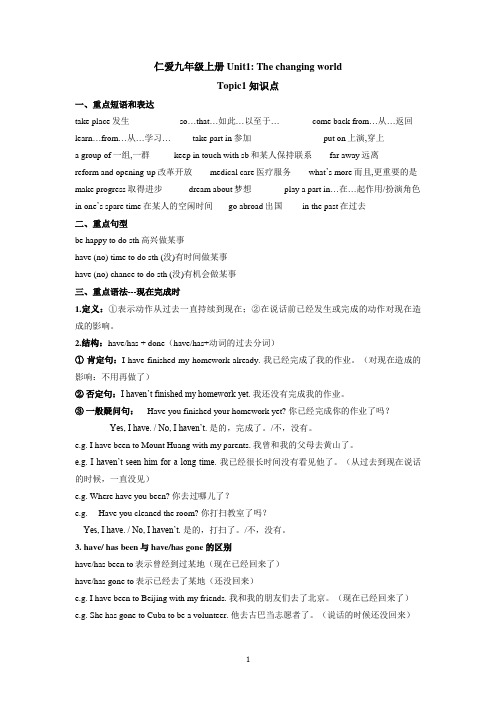
仁爱九年级上册Unit1: The changing worldTopic1 知识点一、重点短语和表达take place发生 so…that…如此…以至于… come back from…从…返回learn…from…从…学习… take part in参加 put on上演,穿上a group of一组,一群 keep in touch with sb和某人保持联系 far away远离reform and opening-up改革开放 medical care医疗服务 what’s more而且,更重要的是make progress取得进步 dream about梦想 play a part in…在…起作用/扮演角色in one’s spare time在某人的空闲时间 go abroad出国 in the past在过去二、重点句型be happy to do sth高兴做某事have (no) time to do sth (没)有时间做某事have (no) chance to do sth (没)有机会做某事三、重点语法---现在完成时1.定义:①表示动作从过去一直持续到现在;②在说话前已经发生或完成的动作对现在造成的影响。
2.结构:have/has + done(have/has+动词的过去分词)①肯定句:I have finished my homework already. 我已经完成了我的作业。
(对现在造成的影响:不用再做了)②否定句:I haven’t finished my homework yet. 我还没有完成我的作业。
③一般疑问句:---Have you finished your homework yet? 你已经完成你的作业了吗?---Yes, I have. / No, I haven’t. 是的,完成了。
/不,没有。
e.g. I have been to Mount Huang with my parents. 我曾和我的父母去黄山了。
英语仁爱版九年级上册 Unit 1 The Changing World

Verb
clean jump chat
fly do am/is/are shut …
Past Tense
cleaned jumped chatted flew
did was/were
shut …
Past Participle
I have beento Mount Huang with my parents.
Oh, she has gone to the library.
现在完成时: have/has + 过去分词
Choose the best answer.
B 1. –– Where is Zhao Ming?
–– He ______ the playground. He is playing football there.
A. has been to
B. has gone to
C. have been to
D. goes to
A 2. Great changes ______ in my hometown.
A. have taken placeB. take place
C. have happened
D. happened
• 他跑的太快以至于我们都赶不上。 • so...that...引导的从句有时可以和too...to...句型
互换。
• e.g. He is so young that he can’t go to school. = He is too young to go to school.
• 他太小了, 还不能上学。
仁爱英语九年级上册unit1重点短语和所对应句子The changing word
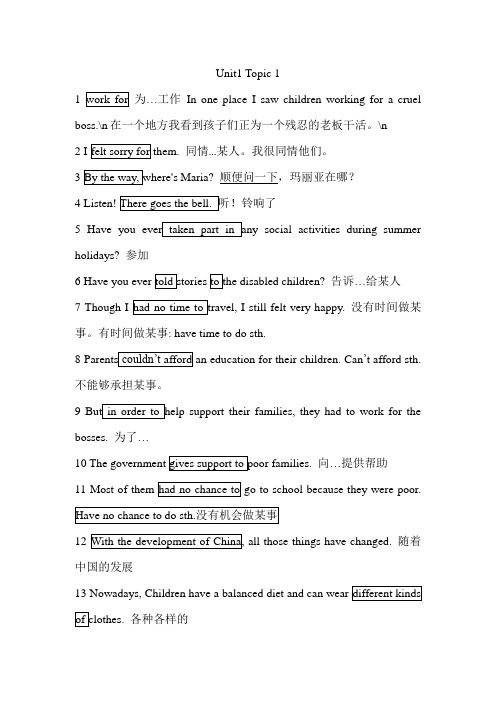
Unit1 Topic 1为…工作In one place I saw children working for a cruel boss.\n 在一个地方我看到孩子们正为一个残忍的老板干活。
\n同情…某人。
我很同情他们。
顺便问一下,玛丽亚在哪?5 Have you social activities during summer holidays? 参加告诉…给某人没有时间做某事。
有时间做某事: have time to do sth.’t afford sth. 不能够承担某事。
9 support their families, they had to work for the bosses. 为了…向…提供帮助随着中国的发展各种各样的activities. So…that 如此…以致16 roads have appeared and people's living比较级+比较级表示越来越…多种多样的18 Children can study not only in modern schools but also on the Internet. 不仅…而且19 Beijing has and it has already20 I the past, live in the present and dream about the future. 做…很重要决定做某事Unit1 Topic 22 and couldn't4 So do I. 我也是So + be\情态动词\助动词+主语(肯定)Neither \ Nor + be\情态动词\助动词+主语(否定)four children. 至少6 But great changes have already in China recently.计划生育政策8 I'm the only child in my family, and I used to be a "Little Emperor".情态动词\助动词+主语(否定)10 So they are very strict with me now. be strict with sb.in developed countries, doesn't it? 该句是反义疑问句,前肯后否,前否后肯而且the population. 执行the people in the world live in China. 五分之一conditions are improving rapidly.人们的生活条件也正在迅速地改善。
Unit 1 Topic 3 重难点知识归纳总结仁爱版英语九年级上册
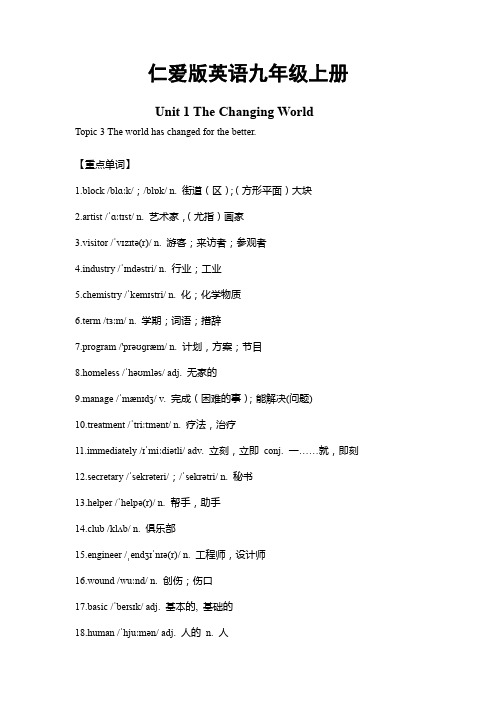
仁爱版英语九年级上册Unit 1 The Changing WorldTopic 3 The world has changed for the better.【重点单词】1.block /blɑːk/;/blɒk/ n. 街道(区);(方形平面)大块2.artist /ˈɑːtɪst/ n. 艺术家,(尤指)画家3.visitor /ˈvɪzɪtə(r)/ n. 游客;来访者;参观者4.industry /ˈɪndəstri/ n. 行业;工业5.chemistry /ˈkemɪstri/ n. 化;化学物质6.term /tɜːm/ n. 学期;词语;措辞7.program /'prəʊɡræm/ n. 计划,方案;节目8.homeless /ˈhəʊmləs/ adj. 无家的9.manage /ˈmænɪdʒ/ v. 完成(困难的事);能解决(问题)10.treatment /ˈtriːtmənt/ n. 疗法,治疗11.immediately /ɪˈmiːdiətli/ adv. 立刻,立即conj. 一……就,即刻12.secretary /ˈsekrəteri/;/ˈsekrətri/ n. 秘书13.helper /ˈhelpə(r)/ n. 帮手,助手14.club /klʌb/ n. 俱乐部15.engineer /ˌendʒɪˈnɪə(r)/ n. 工程师,设计师16.wound /wuːnd/ n. 创伤;伤口17.basic /ˈbeɪsɪk/ adj. 基本的, 基础的18.human /ˈhjuːmən/ adj. 人的n. 人19.value /ˈvæljuː/ v. 重视,珍视n. 价值20.period /ˈpɪəriəd/ n. 一段时间,时期21.shelter /ˈʃeltə(r)/ n. 收容;遮蔽物22.homelessness /hoʊmləsnəs/ n. 无家可归23.earn /ɜːn/ v. 挣钱;挣得,赢得24.drug /drʌɡ/ n. 毒品;药,药物25.mental /ˈmentl/ adj. 精神健康的;思想的26.whatever /wɒtˈevə(r)/ pron. 无论什么,不管什么;任何事物27.effect /ɪˈfekt/ n. 影响,结果;效果28.steal /stiːl/ v. 偷,窃取29.suppose /səˈpəʊz/ v. 帮助,援助;支持30.phrase /freɪz/ n. 短语,词组31.according /ə'kɔːdɪŋ/ to 据……所说,按……所报道32.context /ˈkɒntekst/ n. 上下文;语境;背景borer /'leɪbərə/ n. 体力劳动者,劳工, 工人34.cruel /ˈkruːəl/ adj. 残酷的,冷酷的35.project /ˈprɒdʒekt/ n. 专题研究;项目;方案36.aid /eɪd/ v.&n. 援助;帮助37.primary /ˈpraɪməri/ adj. 小学教育的;主要的;最初的38.contribution /ˌkɒntrɪˈbjuːʃn/ n. 贡献;捐款39.encourage /ɪnˈkʌrɪdʒ/ v. 鼓励40.moral /ˈmɒrəl/ adj. 道德(上) 的41.development /dɪˈveləpmənt/ n. 发展,开发42.respect /rɪˈspekt/ v. 尊敬,尊重43.importance /ɪmˈpɔːtns/ n. 重要性,重要44.continue /kənˈtɪnjuː/ v. 持续,继续做45.college /ˈkɒlɪdʒ/ n.(美国)大学;(英国)学院【重点短语】1.get used to 习惯于ed to 过去常常3.as a matter of fact 事实上,其实4.provide sb with sth 为某人提供某物5.a short period of time 很短的一段时间6.be able to do sth 能够做某事lions of 大量的;数以百万计8.earn money 赚钱9.have a problem with sth 在某方面有问题10.on purpose 故意,有意地11.make a contribution to 为……做贡献12.as a result 结果是,因此【重点句型】1.How do you like living there?你觉得住在那里怎么样?2.Oh, you will get used to it soon if you come.。
仁爱版九年级英语上册Unit 1 The Changing World现在完成时(知识梳理)

Unit 1 The Changing World现在完成时【概念引入】欣赏含有现在完成时的名言:Life has taught me to think, but thinking has not taught me to live.生活教会了我思考,但思考却没有教会我生活。
Winter must be cold for those with no warm memories. We have already missed the spring.对于那些没有温馨回忆的人们来说,冬天一定很冷。
我们已经错过春天了。
Nature has given us the seeds of knowledge, but not knowledge itself.在自然赋予我们知识的种子,而非知识本身。
现在完成时的构成:现在完成时是:助动词have(has)+过去分词构成的。
I have finished my homework. 我已经完成了作业。
现在完成时的否定句:是在助动词have(has)的后面加not构成。
I haven’t seen the film so far. 到目前为止,我还没有看那部电影。
现在完成时的一般疑问句:是把助动词have(has)提到句子主语的前面。
Have you seen the film yet? 你看过那部电影了吗?【用法讲解】一、现在完成时的定义及用法(1)表示过去发生的某一动作对现在造成的影响或结果。
I have just cleaned my clothes. 我刚洗过衣服。
(“洗衣服”是发生在过去的动作,对现在造成的结果是“衣服干净了”)Have you read that story?你读过那个故事吗?(“读”这一动作发生在过去,对现在造成的影响是:是否知道故事的内容。
)在学习这一概念的同时,还应注意常与现在完成时连用的几个副词:already,just,ever,yet,never等。
九年级英语上册 Unit 1 The Changing World Topic 1 O

Unit1 Topic1 重点句子解析【1】There goes the bell.铃响了。
(教材P1)这是一个完全倒装句,当主语是名词时,要把主语放在谓语动词之后。
如:Here comes the bus.车来了。
当主语是代词时用局部倒装句,即把主语放在谓语动词之前。
如:.Here they are.他们在这。
Here they come.他们来了。
【2】I was a volunteer in a disabled children’s home.我曾是残疾儿童之家的一名志愿者。
(教材P3)disabled 意为“残疾的,残废的”。
如:The shop sells all kinds of facilities for disabled people.这家商店卖各种各样的残疾人使用的设施。
【拓展】disable 意为“使丧失能力,使伤残”。
如:He was disabled in a car accident.在一场车祸中他变残疾了。
【3】Though I had no time to travel, I still felt very happy. 虽然我没有时间去旅行,但是我仍然感到很开心。
(教材P3)1)though/although为连词,意为“虽然,尽管,即使'引导让步状语从句,不能与but连用。
如: Though/Although my son is only nine years old, he knows a lot.虽然我的儿子只有九岁,但是他懂得很多。
2) have no time to do sth.意为”没有时间做某事”。
动词不定式在句中作定语修饰time。
如:I have no time to have breakfast.我没有时间吃早饭了。
She has no time to wait for you.她没有时间等你了。
【4】To help others makes us happy.帮助别人让我感到开心。
【教育资料】仁爱英语 九年级上册Unit 1 Topic 3 课文翻译学习专用
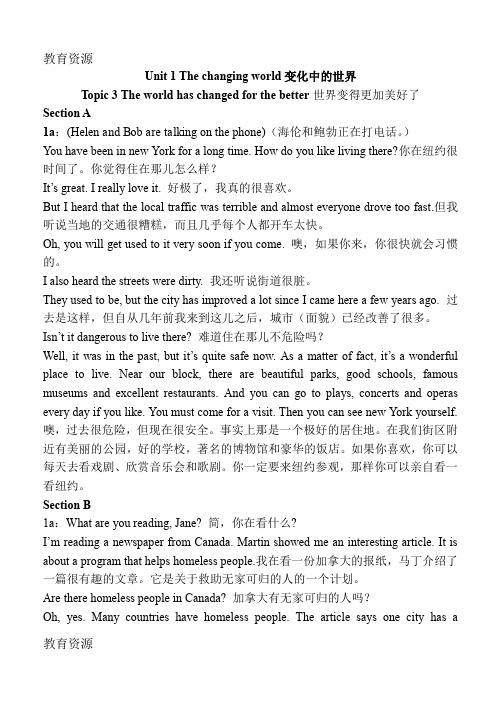
Unit 1 The changing world变化中的世界Topic 3 The world has changed for the better世界变得更加美好了Section A1a:(Helen and Bob are talking on the phone)(海伦和鲍勃正在打电话。
)You have been in new York for a long time. How do you like living there?你在纽约很时间了。
你觉得住在那儿怎么样?It’s grea t. I really love it. 好极了,我真的很喜欢。
But I heard that the local traffic was terrible and almost everyone drove too fast.但我听说当地的交通很糟糕,而且几乎每个人都开车太快。
Oh, you will get used to it very soon if you come. 噢,如果你来,你很快就会习惯的。
I also heard the streets were dirty. 我还听说街道很脏。
They used to be, but the city has improved a lot since I came here a few years ago. 过去是这样,但自从几年前我来到这儿之后,城市(面貌)已经改善了很多。
Isn’t it dangerous to live there? 难道住在那儿不危险吗?Well, it was in the past, but it’s quite safe now. A s a matter of fact, it’s a wonderful place to live. Near our block, there are beautiful parks, good schools, famous museums and excellent restaurants. And you can go to plays, concerts and operas every day if you like. You must come for a visit. Then you can see new York yourself. 噢,过去很危险,但现在很安全。
Unit1TheChangingWorld考点精析课件仁爱版九年级英语上册

A. to
B. for
C. of
D. at
2. It’s brave ____ you to face the master.
A. for
B. to
C. of
D. in
为什么不做某事
why not do(V原) sth. why don’t you do(V原) sth.
Why not ________ swimming. --- Good idea!
arrive / get to / come / reach→be in
2. 两种时态常用的时间状语不同: (1)现在完成时常用的时间状语:for, since, ever, never, yet, already, before, recently, so far … (2)一般过去时的时间状语:yesterday, last week / year / month, one year ago, in 2001, just now …
two thousand/million/hundred 两千/百万/百(具体数字后面不加s)
( )1. Five ____ dollars is a lot of money.
A. million
B. millions C. the million
D. the millions
( )2. The beautiful hotel is about ____ years old.
一、用since或for填空,完成句子 1. I have studied in this school _____f_o_r_______ six years. 2. The concert has been on _______s_i_n_c_e___ two minutes ago. 3. My grandparents have lived in the countryside ___f_o_r_________ almost twenty years. 4. My elder brother has been ill ______fo_r_______ two weeks.
2020九年级英语上册 Unit 1 The Changing World句式精讲精练仁爱版

Unit 1 The Changing World句式精讲精练【句式精讲】1.What about you?What about…?=How about …?意为“……怎么样?”,是一个用来提建议或者征求别人意见的句式,有时也可以用来询问某人的身体状况或者近况。
其中的about是介词,因此后面要跟名词,代词或者动名词来做宾语。
例如:How (What) about the fruit? 那水果呢?How (What) about going swimming? 去游泳怎么样?How (What) about your holiday? 你的假期怎么样?How (What) about your mother? 你妈妈怎么样?2. I have been to Mount Huang with my parents.(1) been是be动词的过去分词形式。
(2) have been to是现在完成时形式,一般与already, ever, never连用。
例如:He has never been to Paris.他从未去过巴黎。
【拓展】have been to; have been in 与have gone to的辨析:(1)“have/ has been to + 地点”表示“去过某地”,现在已经回来了。
例如:I’ve been to Beijing twice. 我已去过北京两次。
(2)“have/has been in + 地点”表示“在某地待了一段时间”。
例如:He’s been in this school for two years.他在这所学校待了两年了。
(3)“have/has gone to + 地点”表示“到某地去了”,现在还没有回来,可能在去的途中,也可能在那里或返回的途中。
例如:—Where’s Wei Hua? 魏华在哪里?— She has gone to the zoo. 她到动物园去了。
九年级英语上册 Unit 1 The Changing World Topic 3 The worl

九年级英语上册Unit 1 The Changing World Topic 3 The world has changed for the better语法全解—现在完成时素材(新版)仁爱版编辑整理:尊敬的读者朋友们:这里是精品文档编辑中心,本文档内容是由我和我的同事精心编辑整理后发布的,发布之前我们对文中内容进行仔细校对,但是难免会有疏漏的地方,但是任然希望(九年级英语上册Unit 1 The Changing World T opic 3 The world has changed for the better语法全解—现在完成时素材(新版)仁爱版)的内容能够给您的工作和学习带来便利。
同时也真诚的希望收到您的建议和反馈,这将是我们进步的源泉,前进的动力。
本文可编辑可修改,如果觉得对您有帮助请收藏以便随时查阅,最后祝您生活愉快业绩进步,以下为九年级英语上册Unit 1 The Changing World Topic 3 The world has changed for the better语法全解—现在完成时素材(新版)仁爱版的全部内容。
语法全解—现在完成时1。
构成现在完成时是由助动词 have(has)+动词的过去分词构成。
助动词说明该谓语是属于现在时范围。
它和主语的人称、数要保持一致。
过去分词是主要的谓语动词,说明句子的意义。
2.用法(1)表示动作发生在过去某个不确定的时间,但对现在留下了某种影响和结果。
常被just、already、yet 等副词修饰。
如:-Have you had lunch yet? —Yes, I have。
I’ve just had it.你(已经)吃午饭了吗?我刚刚吃过。
(现在我不饿了)(2)表示从过去某一时刻开始一直持续到现在的动作或状态。
这个动作可能刚停止,可能仍然在进行.常带有for和since等表示一段时间的状语如:He has taught here since 1981 他自1981年就在这儿教书.(可能还要继续教)I haven’t seen he r for four years。
- 1、下载文档前请自行甄别文档内容的完整性,平台不提供额外的编辑、内容补充、找答案等附加服务。
- 2、"仅部分预览"的文档,不可在线预览部分如存在完整性等问题,可反馈申请退款(可完整预览的文档不适用该条件!)。
- 3、如文档侵犯您的权益,请联系客服反馈,我们会尽快为您处理(人工客服工作时间:9:00-18:30)。
Unit 1 The Changing World句式精讲精练【句式精讲】1.What about you?What about…?=How about …?意为“……怎么样?”,是一个用来提建议或者征求别人意见的句式,有时也可以用来询问某人的身体状况或者近况。
其中的about是介词,因此后面要跟名词,代词或者动名词来做宾语。
例如:How (What) about the fruit? 那水果呢?How (What) about going swimming? 去游泳怎么样?How (What) about your holiday? 你的假期怎么样?How (What) about your mother? 你妈妈怎么样?2. I have been to Mount Huang with my parents.(1) been是be动词的过去分词形式。
(2) have been to是现在完成时形式,一般与already, ever, never连用。
例如:He has never been to Paris.他从未去过巴黎。
【拓展】have been to; have been in 与have gone to的辨析:(1)“have/ has been to + 地点”表示“去过某地”,现在已经回来了。
例如:I’ve been to Beijing twice. 我已去过北京两次。
(2)“have/has been in + 地点”表示“在某地待了一段时间”。
例如:He’s been in this school for two years.他在这所学校待了两年了。
(3)“have/has gone to + 地点”表示“到某地去了”,现在还没有回来,可能在去的途中,也可能在那里或返回的途中。
例如:—Where’s Wei Hua? 魏华在哪里?— She has gone to the zoo. 她到动物园去了。
3. To help others makes us happy.make作使役动词,意为“使……;让……”讲时,常构成make + 宾语(sb./sth.) + 形容词/名词(作宾补),即make sb. / sth. + adj./n.。
例如:What he said makes us happy.他所说的话使我们很高兴。
We made John our monitor.我们选约翰当班长。
【拓展】make作使役动词,还可后接省略to的动词不定式,即:make sb. do sth. 意为“使/让某人做某事”,类似的动词还有let,have等。
例如:The boss made them work for long time.老板让他们长时间工作。
They made us forget past.他们使我们忘记了过去。
4.China has developed rapidly since the reform and opening-up.since为介词,意为“自从”,通常连接一个过去的时间点或一段时间+ago,谓语动词一般用现在完成时。
例如:She has been ill since last weekend.她自从上周末就病了。
She has been in Wuhan since four years ago.自从四年前她就在武汉。
【拓展】since还可以作连词,引导时间状语从句,从句用一般过去时,主句常用完成时。
例如:I have studied English since I came here.自从我来这里就学习英语。
I have known her since I was five years old.自从我五岁就认识她。
5.Chinese people have had more time to spend on various kinds of leisure activities.spend可指花费时间和金钱,其主语为人,常用句型为:主语+spend +“时间或金钱”+on sth.或in(可省略 ) doing sth.I spend five minutes on breakfast every day.我每天花五分钟的时间吃早餐。
He spent an hour writing the letter.他写这封信花了一个小时。
【拓展】句型It takes somebody some time to do sth意为“花费某人一段时间做某事”, take 是动词,意为“花费(时间)”。
It took me forty minutes to do my homework yesterday.昨天我花了40分钟的时间做作业。
It takes half an hour by bus to go to the hospital.坐车去医院要花半个小时的时间。
6. They used to be, but the city has improved a lot since I came here a few years ago.used to do sth是一个固定结构,意思是“过去经常做某事”,后面用动词原形,表示过去的某种经常性、习惯性的行为或者动作,并意味着这种动作目前已经不存在。
肯定句:I used to play with my friends after school.过去放学后我常常和朋友们一起玩。
否定句:You didn’t use to like pop songs.=You usedn’t to like pop songs.你过去常常不喜欢流行歌曲。
一般疑问句:Did your sister use to be quiet? = Used your sister to be quiet?你的妹妹过去常常是很安静吗?there be句式:There used to be a lot of fishes in this river.过去这条小河常常有许多鱼。
【拓展】(1) be used to do something意思是“被用来做某事”,是动词短语use …to do的被动语态结构。
例如:Knives are used to cut things.小刀是用来切东西的。
(2) be used to doing something意思是“习惯于做某事”,to后接动词-ing形式。
例如:My father is used to living in the village.我爸爸习惯于住在小山村。
7.Thanks to the policy, China is developing quickly.thanks to意为“幸亏……;多亏……;由于……”,to后接某人或某物,不表达感谢的含义,而是表达原因,有时可以与because of或with the help of互换。
例如:Thanks to John’s kind help, we finished early.多亏约翰的好心帮助,我们才早早完成。
【拓展】(1)“Thank sb. for…”意为“为……而感谢某人”,也可表达为“Thanks for…”。
例如:Thank you for your help. = Thanks for your help.感谢你的帮助。
(2)“Thank sb. for doing sth.”或者“Thanks for doing sth.”意为“感谢某人做了某事”。
例如:Thank you / Thanks for sending me such a nice present.谢谢你寄给我这么漂亮的礼物。
(3) thank可以用作名词,意思是“谢谢”,常用复数形式。
例如:Many thanks. 多谢。
8. So do I.(1) So do I 是一个倒装句,它的结构是:So+助动词、情态动词、联系动词+主语,它的意思是“某人也是这样、某人也是如此”。
表示后面的主语所发生的动作和前面句子的主语发生动作一样。
助动词、联系动词和前面句子的时态、本句子的主语保持一致。
例如:My mother was watching TV at that time. So was my father.我妈妈那个时候在看电视,我爸爸也是。
(2) 如果前面的句子是否定句,后面的句子表示“某人也是这样”,用Neither/Nor代替So。
例如:-My brother doesn’t like swimming.-Neither/Nor do I.我弟弟不喜欢游泳。
我也是这样。
【句式精练】I. 句型转换,按要求完成下列句子。
英汉互译。
1.I have already seen the film. (改为一般疑问句)Have you _____ the film _____?2.They have brought us very good news. (改为感叹句)_____ _____ _____ they have brought us!3.—Have you ever met each other before? (作否定回答)—_____, _____.4.She’s never late for school. (改为现在完成时)She _____never _____ late for school.5.I’ll not go there unless you go with me. (同义句转换)I’ll not go there _____ you _____ go with me.6. My father used to play cards. (改为否定句)My father ______ _______to play cards.7. How do you like the film?(同义句转换)_______do you _______ ________the film?8. I have been here since I came here two years ago.(对划线部分提问)_______ ________have you been here?9. As a matter of fact, he is always ready to help others.(同义句转换)_______ _______, he is always ready to help others.10. The boy is so young that he can’t look after himself.(同义句转换)The boy is young look after himself.II. 根据汉语提示,完成句子。
